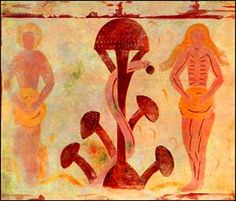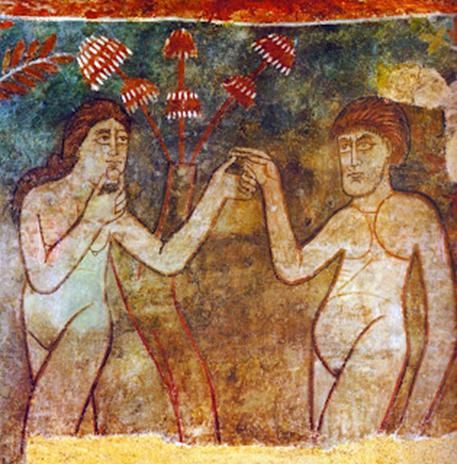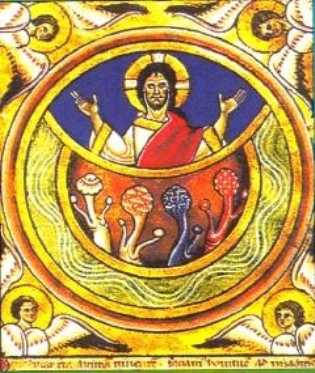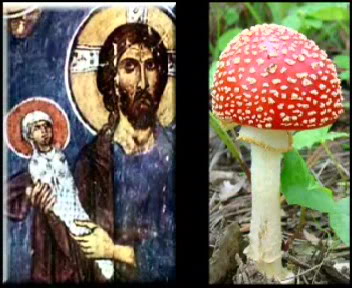Firstly, I would encourage you to look into the actual interpretation of “Hell”.
It never was in the Bible at all.
The original words were “Hades, Tartarus, Gehenna, and Sheol.”, all with different meanings, but none meaning eternal torture in boiling feces.
The word “Hell” is Norse is origin and comes from the niece of Odin, who's name is/was “Hel” one “L”...she was the ruler of the underworld where ALL spirits went...Hades was were ALL spirits went...Gehenna was a burning trash heap outside of Jerusalem which is now a park - so can literally stroll through Hell should you feel inclined lol....Sheol, means pit or grave.
In the middle age the word was synonymous with a root cellar as it was usually dug underground.
It wasn’t until our good friend (or is it fiend?) Dante wrote his torturous vision of “Hell” and the tortures that await for eternity came into being.
As for the apple in the garden - again...it’s a seriously flawed bit of reasoning.
There were actually two trees but only one was forbidden...there was the Tree of Life (cool, eat it), and the Tree of the Knowledge of Good and Evil (forbidden).
Most like to leave that detail out.
There is also an entirely different version of events in the Gnostic gospels that I would also encourage you to read if this is a problem for you.
(Gnostic version - God forbids them from eating the apple - “Lest they become Gods like us.”
Who is “Us” exactly, your guess is as good as mine.)
Anyhow.
God created it all right?
So God also created the garden.
He made the two special trees, forbade them from eating from one.
But God is also all knowing yes?
Has power and dominion over all things yes?
Is supposed to be kind and just and compassionate yes?
The vengeful God of the Old Testament was supposed to be superseded by a new law of love - and love one another, no more and eye for an eye.
So by those same ideas, God created “Hell” as well and controls it all too yes?
Here is the problem with torture being eternal - there will come a moment in the vast span of time when no matter what your sin(s) are, eventually the punishment will outweigh the crime and at that moment “Hell” and God also become unjust.
If God is all knowing then he also knew that they would eat the apples - in fact one would have to assume that it was indeed His plan all along.
Otherwise God is not all knowing, he was tricked along with Adam and Eve by Satan - who was also created by God and is ultimately under His control as well.
You see, the Bible is quite illogical in many areas....the story of Adam and Eve I wouldn’t take as anything more than a parable...but it’s an interesting one nonetheless.
So why put the tree there at all?
Why tell them they can’t eat from it knowing that they will?
It’s either God is not all-knowing, or it was the plan all along.
Either way, why would anyone punish you or me or anyone else for a “sin” committed who knows how long ago (if it happened at all) and had it not happened - the rest of the world and people wouldn’t exist.
As far as reincarnation carrying over sins or karma from a past life, I guess that depends on your beliefs.
Imho, if we do carry over “karma” it’s because it was our own choice to carry it over - to work on areas of our Self that need to be refined.
So again...if original sin is true...there is no justification to punish someone because it’s fated but also especially since Jesus was sent to eliminate those sins.
Jesus was sent to “save the whole world”...not just a few Baptists, or Mormons, or Evangelicals, or Muslims, or Buddhists, etc.
Right before Jesus died on the cross what did he say?
“Father forgive them”
These are the people who are killing Jesus - probably the number one WORST sin ever possibly committed.
And he asked they be forgiven.
If Jesus were sent to save us all - then he failed, plain and simple if we look at it through the lens of most organized religions of the present.
Or you can look at it as - he did not fail, he sacrificed himself and took on the sin of us all - “the whole world”, not just a select few.
The stories of the Bible have been omitted, changed, words added, etc.
The Apocryphal stories that were removed also have the underlying theme of - Heaven being inside you and everyone else always.
That you don’t need a go-between like a pastor or priest or pope to reach it - all one needs to do is turn inward.
So again...we know for a fact that books were taken out of the Bible, that stories were not put down into actual writing hundreds if not thousands of years after said events took place.
Here is one such omission which gives a entirely other view of this story.
Adam and Eve
Just as Adam and Eve are regarded as central characters in the Christian creation myth, they are equally as important in that of the Gnostics. As mentioned in previous articles, the creation of the world according to Gnostic tradition is an account of the world created not by the True God, but by a false god.
As Adam and Eve were created and placed in the Garden of Eden in Genesis, the same has been done in Gnostic scripture.
However, the demiurge is responsible for the placement of Adam and Eve in the Garden of Eden.
The demiurge has created the fleshly bodies to entrap the spirits of Adam and Eve.
Adam is placed under a spell of ignorance and put to sleep by the false god.
Eve is placed next to him, and she commands Adam to awaken.
When Adam sees Eve, he believes that she is his creator.
The demiurge wanted to keep Adam and Eve ignorant; forever worshipping him.
The Gnostics believe that the demiurge was posing as the false god, thus keeping Adam and Eve under his spell of ignorance.
As long as Adam and Eve believed that he was the only god, they would worship him forever.
The serpent is regarded as an evil figure in traditional Christian stories, but to the Gnostics, the serpent is the hero!
The Gnostic text teaches that as the demiurge tells Adam and Eve that they may help themselves to anything the Garden, they are to stay away from the Tree of Knowledge.
As Adam and Eve listen to the serpent, their eyes are opened, and the spell of ignorance is broken forever.
Because they chose to listen to the serpent, Adam and Eve no longer worship the demiurge, but recognize that there is the True God, and he was not the creator of the evil, imperfect, material world.
Adam and Eve gave birth to two children, Seth and Norea.
The descendents of Seth regard themselves as Sethians, those that have been blessed with the gnosis.
Many also believe that the Tree was not a tree at all and certainly not an apple.
There is a good theory that the fruit was in fact some kind of magic mushroom - as many very old Christian murals show images that make it pretty obvious.
Some even think that Jesus didn’t exist, but was the (hidden) human representation of the entheogenic mushrooms said to open your mind(s) to a deeper understanding of the universe and our connection to all things including God/Source/etc.
I’ll leave it at that for you to ponder.
Let’s talk more.
Take it easy!
Much love!




